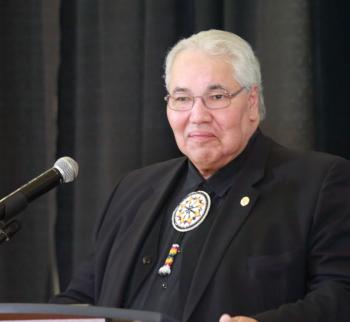Truth and Reconciliation on Indian Residential Schools: the Road Ahead
By Dennis Gruending
The Truth and Reconciliation Commission of Canada (TRC) will release its final report into the history and legacy of Indian residential schools on June 2. There is very little suspense about what the three commissioners think about the schools: they were an aggressively assimilationist policy at best and genocidal at worst. That much was signalled in the TRC’s interim report in 2012 and in recent comments made by commission chair Justice Murray Sinclair. More telling in the report will be what the commission has to say about the way forward. If ever there is to be true reconciliation, Canadians will have to acknowledge and repent for an ugly and enduring episode in our history. Interim report Here is a much abbreviated summary of that interim report: The schools were an assault on Aboriginal children, their families and communities. The impact of forcibly removing children from their families and communities and placing them not schools where they were humiliated and not allowed to speak in their mother tongues were, in the commissioners’ words, “immediate” and “on-going.” The schools were also an assault on self-governing and self-sustaining Aboriginal nations. “The residential school system,” the commissioners wrote, “was intended to assimilate Aboriginal children into the broader Canadian society. With assimilation would come the breaking up of the reserves and the end of treaty obligations. In this way the schools were part of a broader Canadian policy to undermine Aboriginal leaders and Aboriginal self-government.” Finally, the commissioners said that Canadians “have been denied a full and proper education as to the nature of Aboriginal societies, and the history of the relationship between Aboriginal and non-Aboriginal peoples.” “Candy stores for pedophiles” Justice Sinclair spoke at a May 22 event at Ottawa’s city hall and nothing in his remarks indicated a softening of tone from the interim report. Sinclair used a line about the schools being used to “kill the Indian in the child”. He said they constituted “a breach of human rights on a massive scale.” Finally, he described residential schools as being “like candy stores for pedophiles.” But Sinclair also referred to the TRC’s mandate to “inspire a process of reconciliation and healing.” Reconciliation will take generations but it must begin now, Sinclair said. “The commission cannot provide reconciliation because reconciliation is a relationship that requires commitment and faith.” It is not a question, he added, of whether reconciliation should happen but a question of if it should. “If we answer that question positively, then reconciliation will happen.” Inspired by RCAP Sinclair also provided a clue to issues that go well beyond residential schools. He said the commissioners began their work by reacquainting themselves with recommendations of the Royal Commission on Aboriginal Peoples (RCAP), which reported in 1996. The RCAP was appointed by the Mulroney government in 1990 following a violent standoff at Oka, Quebec. In March of that year Mohawks at Kanesatake, west of Montreal, set up a blockade to prevent bulldozers from breaking ground for a golf course. Incredibly, it was to be built on a native burial ground and on land that the Mohawks claimed was rightfully theirs. The commission’s exhaustive report set out a 20-year agenda for implementing changes but it was brushed off by the government of Jean Chretien which succeeded Mulroney in 1993. The RCAP talked about a policy by settlers, their governments and institutions of displacing and dispossessing Indigenous peoples over a period of several hundred years. The commission focused on four of the major instruments of that dispossession: the Indian Act; residential schools; the relocation of entire Indigenous communities in the name of development or administrative efficiency; and the abysmal treatment of Indigenous veterans who served Canada in wartime but were shunned and neglected once they returned home. The TRC’s mandate deals mainly with just one of those four colonial instruments but reconciliation will be about more than residential schools. A defining moment It remains to be seen how the government will respond to the commission’s report. The TRC was not appointed by the government but arose out of a class action law suit filed by 80,000 survivors against the federal government and churches who ran the schools. It was those former students who insisted on a truth commission and the money to pay for it came out of the overall settlement. The TRC’s relationship with the government has always been strained and the commission even went to court over the government’s refusal to turn over residential school records. Immediately after the TRC releases its report there is time set aside on its agenda at an Ottawa hotel for churches and the government to respond. What will they say? This may be just another occasion for Canadians to choose not to hear what is true. Or it may be a defining moment in which we seek to individual and collective ways to act upon a true reconciliation which has been so long in coming.
|
.
Any original material on these pages is copyright © BishopAccountability.org 2004. Reproduce freely with attribution.
